Officials at Yellowstone National Park are on the offensive to dispel rumors that the park's underground supervolcano may erupt.
The rumors became sensationalized after a video of a herd of bison purportedly fleeing a possible volcanic eruption went viral. The video was posted on March 20, 10 days before a magnitude-4.8 earthquake hit the park - the strongest in three decades.
However, park officials report that the earthquake, although it was strong, was just one of thousands that occur annually at the park and that the animals' behavior in the days preceding the earthquake was nothing out of the ordinary at this time of year.
"We do have bison, elk and other animals that have moved outside the park recently," Al Nash, Yellowstone's Chief of Public Affairs, said in a video statement (below). "But they're doing that because they're the depth of winter. Food is a little hard to find in places inside Yellowstone, and [animals] tend to migrate at this time of the winter outside the park to lower elevations where they think there might be something to eat that's easier to get at."
According to park spokesman Dan Hottle, who spoke with the Jackson Hole Daily, the video of the bison running was shot near his house and the animals are actually running towards the supervolcano's 55-mile-by-18-mile magma chamber.
"It was actually shot about a hundred yards behind my house" in Mammoth, Hottle told the Jackson Hole Daily "They're heading back up into the park."
Additionally, a geologist who has spent his career studying seismic activity and magmatic qualities at Yellowstone was equally quick to dispel the rumor.
Bob Smith, a professor at the University of Utah, told Jackson Hole Daily that the March 31 earthquake was centered north of the caldera boundary. "So the earthquakes are in a system that's dominated by faults as opposed to a system that's dominated by magmatic activity," he said.
Yellowstone officials said that the video of bison running is simply the animals being themselves.
"It was a spring-like day and they were frisky. Contrary to online reports, it's a natural occurrence and not the end of the world," park spokeswoman Amy Bartlett told the Chicago Tribune.
© 2024 NatureWorldNews.com All rights reserved. Do not reproduce without permission.





